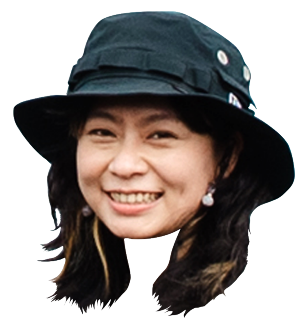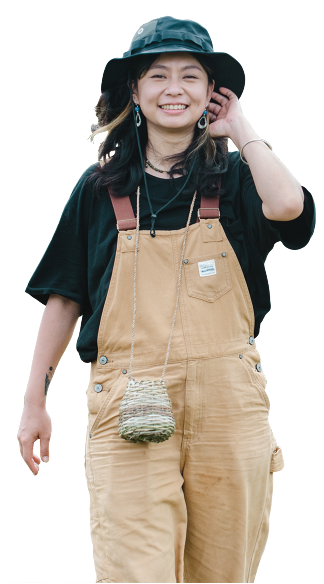How did the wild vegetables picking go?
 At first, I thought we had to go into the mountains like the first day to get them, but turns out a lot of them just grow by the road. So I think it means no one intentionally grows wild vegetables, they just pop up wherever and you have to know how to identify them or else you’d be in trouble. I think right now I can only identify Sama. But its leaves grow in very irregular shapes and I can only recognize one of its forms. If it grows into another shape, I don’t recognize it anymore. This is also something that surprised me - the same plant could have different shapes and forms. I never knew that! That makes it even more difficult to tell the plants apart. If I had to collect them in the wild on my own, I’d probably poison myself.
At first, I thought we had to go into the mountains like the first day to get them, but turns out a lot of them just grow by the road. So I think it means no one intentionally grows wild vegetables, they just pop up wherever and you have to know how to identify them or else you’d be in trouble. I think right now I can only identify Sama. But its leaves grow in very irregular shapes and I can only recognize one of its forms. If it grows into another shape, I don’t recognize it anymore. This is also something that surprised me - the same plant could have different shapes and forms. I never knew that! That makes it even more difficult to tell the plants apart. If I had to collect them in the wild on my own, I’d probably poison myself.
Did you enjoy your first taste of stone hot pot?

The stone hot pot was amazing, it was great! The umami flavor is completely different. Originally I thought the stone would be cooked with the soup, so imagine my shock when they threw a steaming hot stone into the water! I didn’t know you could cook like that and the soup really tasted wonderful. Actually, I snuck a Maifan stone into my pocket. I’ll use it as a reference to look for more stones, haha!
What cultural similarities and differences did you observe in the past three days?

I think the concept of time is very different. They acknowledge certain things take time to work out; unlike us, we compress time and try to complete a lot within a very short period of time. They don’t really care about efficiency. I don’t mean it in a bad way, they just let things occur naturally. This is something that has never crossed my mind. And the mentor also mentioned that if there are termites, just put out wood for them to eat. I think that is a good idea, using natural ways to keep the pests out of your way. But what about the cockroaches in my kitchen? What can I do? Put food on the balcony? This would look like I’m feeding the cockroaches...I’m not sure how I’m going to deal with that at the moment, but his words do make sense.
Any thoughts after these three days?

Even after spending three whole days in this environment, I still feel like a tourist. The life wisdom of the indigenous peoples is endless, you need to immerse yourself in the environment for a very long time to fully understand it. However, my question is if everyone can participate in this activity, it could become very touristy; yet if a non-indigenous person wants to learn all of this, where can they start? I’ve heard that even some indigenous members find it challenging to return to their communities to learn all of this, so I’m wondering are there too many restrictions? But I know the restrictions are there for a reason, because if the access is too easy then the whole activity would become a performance.
Originally, I thought this project was simply designed for ordinary people to observe and experience the traditional ways of indigenous life. With this in mind, I did not take it seriously but thought I was coming for an outing. Never did I expect that it would turn out to be a survival camp in the following three days.
At first sight of the house, I thought it was nothing more than a traditional hut built with bamboo and thatch. But I was surprised to find that despite its primitive appearance, the interior was well planned and equipped as if it were a reconstructed model displayed in the National Museum of History. What distinguished it from the latter was its strong atmosphere of life. After lunch, I still felt myself to be a tourist until Akac Orat reminded me: “Feeding yourself is important. Hurry up and eat your fill, we’re getting to work.” I came to realize later that there were no other challenges as hard as those daily tasks like hunting, food gathering and collecting firewood for cooking when it comes to living a primitive indigenous life. One could hardly survive if they came with a playful mentality as if attending an afternoon tea party.
Walking along the bumpy trail to the mountains that afternoon, I felt relieved and secretly delighted about the lesson on wild plants. Little did I expect that the road had become so slippery with the rain that my new hiking shoes could not protect me from falling. Although I had always considered myself athletic, I inevitably began to walk cautiously after a few slips. As I watched the earnest Akac Orat introducing the wild plants and explaining their uses, I felt a deep despair down to the core, for I could even hardly remember the names of people around me, let alone the plants. To make matters worse, I had to learn to cut the dongec rattan with a sickle without damaging the stem. For a clumsy person like me, who had failed to hold a knife correctly, this challenging task nearly drove me to a breakdown. Akac Orat once said, “Observing is the best way of teaching and learning.” But however hard I tried to imitate him; I just could not learn the ropes. Then my impulsive and uncompromising nature as a fire sign stood out in the face of such a huge challenge. Reluctant to throw in the towel, I kept waving the sickle, but only to return with frustration and a sore body in the end. Not until then did I understand that what is meant by experience is something that must be tried for yourself by using your body to acquire the feeling along the process. Just as Akac Orat noted, “Quite a few people are brilliant in mind but clumsy in body,” I’ve personally experienced what it means to be “easier imagined than done.”
While living in the city, I can hold up to three meetings a day plus work part-time, which requires me to manage my time precisely. But when exposed to such a primitive way of life, I find my sense of time completely different. The timespan is elongated. It takes three to five years to build a family house, and several years for plants to grow, but no one knows precisely how long it takes to develop a bodily feeling to familiarize yourself with the use of tools. Only then do I realize that it takes numerous repetitions to become skilled. There are neither shortcuts nor petty tricks for one to succeed. What we have are time and body. Our forebears spent their whole lives seeking to improve their ways of life. Nowadays, however, as we enjoy the ease of eating, drinking, defecating, urinating, and sleeping brought by modern conveniences, we dare not boast that our life is more fulfilled than those of our ancestors. Knowledge is not equal to wisdom because “knowing about something” is entirely different from “learning through experience.” How much of our time is spent in developing our bodily feelings and sharpening the acuity of the senses, anyway?
 Akac Orat once told me about his experience of being struck by a wave crashing into a reef, resulting in injuries over the entire body. To me, this forms a sharp contrast with the endeavors of our forebears, who strived for generations to pursue a more advanced way of life to avoid getting injured. But they could never have expected that nowadays, we have entered a time of trauma. I can’t judge which is the right path to choose but hope that I’ll be able to explore more potential ways of living in the future with the firsthand experience gained through this project.
Akac Orat once told me about his experience of being struck by a wave crashing into a reef, resulting in injuries over the entire body. To me, this forms a sharp contrast with the endeavors of our forebears, who strived for generations to pursue a more advanced way of life to avoid getting injured. But they could never have expected that nowadays, we have entered a time of trauma. I can’t judge which is the right path to choose but hope that I’ll be able to explore more potential ways of living in the future with the firsthand experience gained through this project.
2022.06.08





